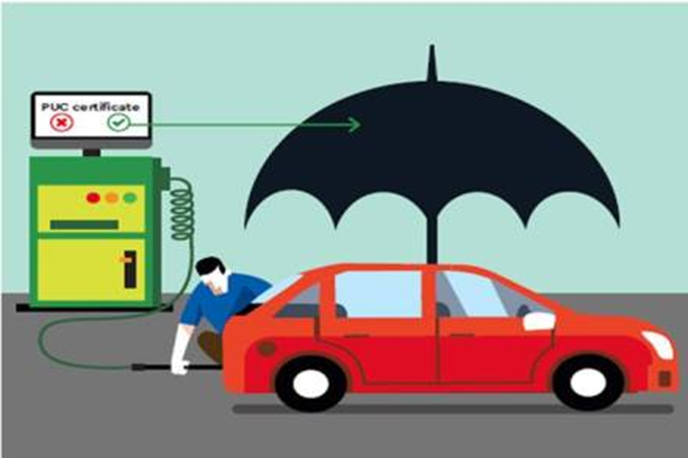- Courses
- GS Full Course 1 Year
- GS Full Course 2 Year
- GS Full Course 3 Year
- GS Full Course Till Selection
- Answer Alpha: Mains 2025 Mentorship
- MEP (Mains Enrichment Programme) Data, Facts
- Essay Target – 150+ Marks
- Online Program
- GS Recorded Course
- Polity
- Geography
- Economy
- Ancient, Medieval and Art & Culture AMAC
- Modern India, Post Independence & World History
- Environment
- Governance
- Science & Technology
- International Relations and Internal Security
- Disaster Management
- Ethics
- NCERT Current Affairs
- Indian Society and Social Issue
- NCERT- Science and Technology
- NCERT - Geography
- NCERT - Ancient History
- NCERT- World History
- NCERT Modern History
- NCERT Medieval History
- CSAT
- 5 LAYERED ARJUNA Mentorship
- Public Administration Optional
- ABOUT US
- OUR TOPPERS
- TEST SERIES
- FREE STUDY MATERIAL
- VIDEOS
- CONTACT US
PUC Not Mandatory to Renew Car Insurance
PUC Not Mandatory to Renew Car Insurance
30-07-2024

Recently, The Supreme Court abolished its own directive issued in 2017 that made a valid Pollution Under Control (PUC) certificate mandatory for the renewal of third-party insurance policies.
- This decision was made in response to an application moved by the General Insurance Council (GIC), highlighting the problems arising from the implementation of the apex court’s August 10, 2017 order in the MC Mehta case relating to pollution in Delhi.
Key Points:
- Bench Decision:
The order was passed by a bench headed by Justice AS Oka, which also comprised Justice Augustine George Masih. The bench stated, “If said direction is allowed to be implemented in letter and spirit, it will have disastrous consequences as some vehicles will continue to operate without third-party insurance.” - GIC's Argument:
Solicitor General Tushar Mehta, representing GIC, submitted that the court order was proving detrimental for motor accident victims as nearly 55% of vehicles do not have insurance cover. This posed great difficulty for victims seeking settlement of compensation claims in road accidents. - Background:
The 2017 order was passed when pollution levels in Delhi were on the rise, and the court initiated drastic measures to keep it under control. The order was based on the recommendation of the Environment Pollution (Prevention and Control) Authority (EPCA), a statutory body assisting the court on environment and pollution-related issues. - Impact of the Order:
The 2017 order stated, “It is made clear that the insurance companies will not insure a vehicle unless it has a valid PUC certificate on the date of renewal of the insurance policy.” The GIC claimed that the order was passed without hearing it or any insurance companies. - Previous Attempts:
In February 2018, GIC moved an application for modification, which was rejected by the SC registry on the ground that the application sought a review of the top court’s order. Challenging this order of rejection by the SC registrar, GIC urged the apex court to consider its application as it raised an issue of “serious public importance.” - Amicus Curiae:
Senior advocate Aparajita Singh, assisting the court as amicus curiae, had held discussions with the solicitor general to devise a way out to overcome the problem. On Friday, Singh supported the application moved by GIC to recall the earlier order.
About Pollution Under Control (PUC) Certificate:
- Definition:
The PUC Certificate, often referred to as the pollution certificate, is a mandatory document for every vehicle owner in India. - Purpose:
This certificate states that you can legally ride/drive a vehicle in India with respect to meeting environmental standards. It is a validation document that states that the vehicle’s emission levels are within the permissible levels set by the government. - Legal Requirement:
All vehicles on Indian roads are required to possess a valid PUC certificate under the Central Motor Vehicles Rule 1989. - Exemption:
Usually, a new vehicle is exempt from PUC in the first year. Following this, the vehicle has to undergo mandatory PUC tests at regular intervals to get a validity certificate. - Validity:
A PUC certificate is usually valid for a year from the date of issue. - Penalties:
Failure to produce a PUC certificate can invite a fine of up to Rs 10,000 or six months of imprisonment or both under the Motor Vehicle Act. The vehicle owner may also be disqualified from holding their license for three months. If the vehicle is found to be emitting fumes beyond the prescribed limit, despite possessing a valid PUC certificate, the certificate will be canceled. The vehicle owner will have to obtain a new PUC certificate within seven days. - Applicability:
The PUC certificate rule is applicable to CNG-powered vehicles in addition to petrol and diesel vehicles.
How to Get a PUC Certificate:
- Issuance:
A PUC certificate can be obtained from a government-authorized emission test center with a computerized facility. - Procedure:
The issuance of an emission test certificate involves a thorough examination of the vehicle’s exhaust gas, and the test results are mentioned in the PUC certificate.
About the Motor Vehicle Act of 1988:
- Definition:
It is a comprehensive Act that replaced the Motor Vehicle Act, 1939. It was implemented on 1st July 1989. - Coverage:
The act covers all aspects of road transport vehicles, such as registration, licensing, regulation, claims, compensation in case of accidents, etc. The act regulates all cases related to motor accidents all over India. - Compensation:
An person injured in a motor accident or legal representatives of a person deceased in a motor accident can apply for compensation under the Motor Vehicles Act, 1988.
Conclusion:
The Supreme Court's decision to abolish the directive making a valid PUC certificate mandatory for the renewal of third-party insurance policies highlights the need to balance environmental compliance with practical considerations for vehicle owners and insurance providers. This move aims to address the challenges faced by motor accident victims and ensure that vehicles remain compliant with PUC norms while also having insurance cover.
Must Check: Best IAS Coaching In Delhi
UPSC Prelims Result 2024 Out: Expected Cut Off & Other Details, UPSC Prelims 2024 Answer with Explanation, Daily Prelims Quiz, Daily Current Affairs, MONTHLY CURRENT AFFAIRS TOTAL (CAT) MAGAZINE, Best IAS Coaching Institute in Karol Bagh, Best IAS Coaching Institute in Delhi, Daily Mains Question Answer Practice, ENSURE IAS UPSC Toppers, UPSC Toppers Marksheet, Previous Year Interview Questions, UPSC Syllabus




